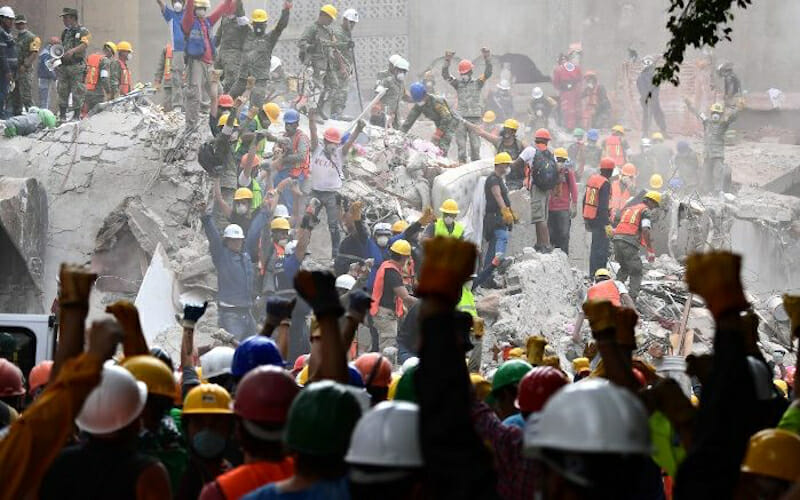
Mexico: Resilience and Solidarity
At the moment of this writing, the earthquake that shook central and southern Mexico last month has claimed the lives of more than 300 individuals, has left over 2,600 injured and has collapsed or severely damaged buildings throughout six different states. Quantifying the number of rescue efforts by Mexicans in the face of this tragedy is not something that can be easily done. Several locations with collapsed infrastructure have been visited by such a vast number of volunteers that authorities have told people to stop going to these areas in order not to interrupt ongoing rescue operations. That last example showcases how citizens have been united by the earthquake.
Drawing a parallel with the 1985 earthquake, society has been in charge of removing stones, bricks, concrete and other materials, providing accommodation for those who have lost their homes, donating money or supplies to places where they are needed the most, cooking a hot meal for volunteers and many other actions that have had the ultimate goal of finding and helping as many survivors as possible.
The country and the world have seen heartbreaking stories, including the case of an elementary school where over 21 children died as well as captivating narratives, such as the emergence of rescue dogs that have saved the lives of dozens of people.
A tipping point
1985 was a year in which Mexico changed. The insufficient earthquake response given by Miguel de la Madrid’s administration after the disaster was an important factor that contributed to the PRI’s political decline in subsequent years and its eventual defeat in the 2000 Presidential elections.
Although the consequences of the current cataclysm are yet to be felt, Enrique Peña Nieto will have to tread lightly if he wishes to avoid a debacle for an already panned government.
Mexico is no stranger to natural disasters and 2017 has been particularly harsh in that regard. In addition to the consequences brought by last Tuesday’s catastrophe, the country has had to face another powerful earthquake on 7 September, which killed almost 100 people and whose damage extended to the southern states of Oaxaca, Chiapas and Tabasco. Hurricanes Franklin, Harvey and Katia have also hit several states within a short time period, making this year a particularly difficult year for the country as a whole.
Learning through the aftermath
Ultimately, when a disaster of such magnitude hits, everything else feels secondary. When the brutality of buildings collapsing, cars shaking violently, glass windows breaking, the screaming of distressed people, the smell of gas, the fire, the high-pitched alarms, whimpers and vast quantities of smoke happen all at once is when the importance of helping those who might not be as lucky comes into place. It is when tragedy hits that resilience and solidarity should emerge.
September 19, 2017 and all the efforts that have ensued afterwards should serve as a reminder of what Mexico is all about: uniting behind a single cause and showing overwhelming support to the victims, regardless of circumstances. Empathy, whether it is expressed locally or abroad, is a rare commodity but one that preserves our humanity. It must be protected at all costs.
¡Que viva México!
You can help too
If you are interested in donating to help the relief efforts in Mexico, you can do so using the following links: Project Paz, Save the Children Mexico, Mexican Red Cross, UNICEF Mexico.
